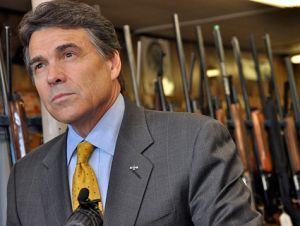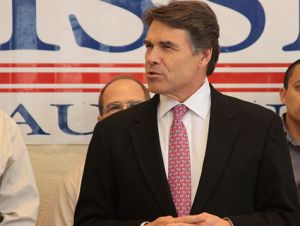One of the more riveting (yes, riveting) exchanges during Monday’s GOP presidential debate came when Texas Governor Rick Perry was pressed on his decision to issue an executive order mandating that all adolescent girls in the state be vaccinated for HPV. Reps. Michele Bachmann (R-Minn.) and Ron Paul (R-Tex.) took shots at Perry for infringing on the liberties of parents and children (Bachmann chillingly called it a “government injection through executive order”). But the most damaging aspect of Perry’s decision was that it reeked of crony capitalism—he had just received a $5,000 campaign contribution from Merck, the company that produced the vaccine, and his former chief of staff, Mike Toomey, was an Austin lobbyist for the company; Toomey is currently running a pro-Perry super PAC with the stated goal of raising $55 million during the primary.
Bachmann took a pass on the lobbying angle last week, but she broached the issue on Monday. And Perry had a response ready for her: “If you’re saying I can be bought for $5,000 I’m offended.”
Boom. So what is Rick Perry’s price? If the past is any indication, it’s closer to $25,000. That number’s not random; it comes from Perry himself. In one of the few controversies of his career as lieutenant governor, he received a black eye in 2000 when it was revealed that he was not-so-subtly baiting top Austin lobbyists into donating big bucks to his campaign war chest. As Texas Monthly explained it:
First, an embarrassing e-mail came to light. Written last year by Dallas insurance executive Robert Reinarz, it claimed that lobbyist Bradley Bryan had persuaded Perry not to appoint a Senate committee to study insurance deregulation in exchange for a $25,000 campaign contribution from the industry. Insurance deregulation was not among the studies ordered by Perry during the interlude between legislative sessions, and according to the Dallas Morning News, Perry did receive $19,000 from insurance interests at a fundraiser held shortly after the e-mail was sent. Perry insists that there was no link between the contributions and his failure to order a study on insurance deregulation, and Bryan told the News that he had never spoken to Perry about the issue…
Next came the controversial fundraising letter. The mailing to lobbyists contained an invitation to a September reception with an attachment listing each lobbyist’s clients, with suggested donation levels up to $25,000. While it is common for lobbyists to be asked to round up contributions—it’s the price of doing business at the Capitol—the actual checks usually come from clients. Fundraising quotas are not unheard of, but they are rarely written down. To lobbyists, the letter seemed to say, I know who your clients are, and if they don’t come up with the big bucks, I’m holding you responsible.
Perry’s explanation is that he merely hoped to determine who was really responsible for the contributions so that he could thank them properly. After his last fund-raiser, he says, he received complaints from people who felt that they had not been properly thanked. Even Perry’s friends in the lobby felt that the letter had been poorly executed. Mike Toomey, a Perry confidant who represents an HMO and a tort-reform alliance, among many other interest groups, approved the idea of the letter in advance but now concedes, “In the intervening time, after the insurance e-mail and the DPS video, some of Perry’s people should have looked at the fundraising letter and asked themselves if anything had changed.”















